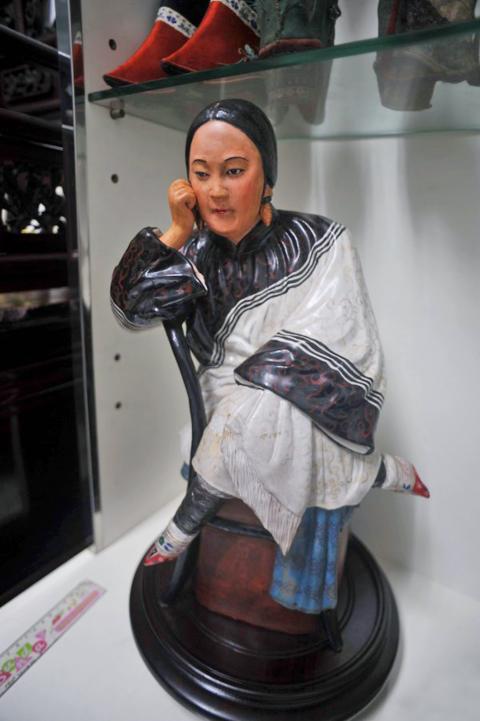A New Taipei City doctor, who is recognized as an authority on the traditional Chinese practice of foot binding, has a collection of more than 10,000 pairs of lotus shoes.
David Ko (柯基生), who works at Broad River Hospital in New Taipei City’s Tucheng District (土城), has been called a collector, an archeologist, an anthropologist and a sexologist.
Ko was first interested in the study of foot binding when he was 10 years old, which led to his study of medicine.

Photo: Huang Shao-kuo, Taipei Times
Ko said he is curious about what has been a taboo subject, adding that about 3 billion people had their feet bound before the practice ended in the 20th century.
Ko has traveled throughout Taiwan and China photographing and interviewing more than 300 elderly women who had their feet bound.
Ko’s collection is thought to be the largest and most comprehensive and has attracted the attention of the Smithsonian Institution National Museum of Natural History, which has borrowed the collection and invited Ko to speak.
Ko has about 5,000 “golden lotus” slippers, which are 3 Chinese inches long (about 10cm), and was once considered the ideal foot length.
He has also collected more than 1,000 photographs of women and girls with bound feet.
Ko said he bought his first pair of lotus shoes for NT$640 at an antiques shop when he was 18.
Foot binding represents the widest-scale example of a cultural practice that involves modifying the female form in the pursuit of “aesthetic perfection,” Ko said, adding that the practice was widespread in China during the Northern Song Dynasty and continued for about 1,000 years.
Young girls who chose to have their feet bound did so not for male pleasure, but rather as a form of self restraint, Ko said, adding that the practice formed part of a system of ethics and self-cultivation.
Ko said some males also underwent the practice, adding that historians have connected the practice with male prostitution and to a social practice among some families to raise boys as girls.
Ko said he was surprised to discover that many of the shoes in his collection had belonged to males.
The practice was mostly popular among wealthy Han families, but spread to Manchurians during the Qing Dynasty, Ko said, adding that the expression “small feet are for ladies, large feet are for slaves” became popular in Qing society.
The Qing court officially forbade the practice among Manchurians, but were powerless to stop it, Ko said.
The practice continued in Taiwan even after it was seen as shameful in China, Ko said.
The Japanese colonial administration and civic organizations in the 1920s ended the practice in Taiwan, he said.
Many shoes in Ko’s collection were damaged by environmental conditions and rodents.
Ko said he began sealing the shoes in air-tight bags 10 years ago, adding that he controls the lighting, humidity and temperature in his storage room to preserve the collection.

Chinese spouse and influencer Guan Guan’s (關關) residency permit has been revoked for repeatedly posting pro-China videos that threaten national security, the National Immigration Agency confirmed today. Guan Guan has said many controversial statements in her videos posted to Douyin (抖音), including “the red flag will soon be painted all over Taiwan” and “Taiwan is an inseparable part of China,” and expressing hope for expedited reunification. The agency last year received multiple reports alleging that Guan Guan had advocated for armed reunification. After verifying the reports, the agency last month issued a notice requiring her to appear and explain her actions. Guan

GIVE AND TAKE: Blood demand continues to rise each year, while fewer young donors are available due to the nation’s falling birthrate, a doctor said Blood donors can redeem points earned from donations to obtain limited edition Formosan black bear travel mugs, the Kaohsiung Blood Center said yesterday, as it announced a goal of stocking 20,000 units of blood prior to the Lunar New Year. The last month of the lunar year is National Blood Donation Month, when local centers seek to stockpile blood for use during the Lunar New Year holiday. The blood demand in southern Taiwan — including Tainan and Kaohsiung, as well as Chiayi, Pingtung, Penghu and Taitung counties — is about 2,000 units per day, the center said. The donation campaign aims to boost

The Kaohsiung Tourism Bureau audited six hotels in an effort to prevent price gouging ahead of Korean band BTS’ concert tour in the city scheduled for Nov. 19, 21 and 22 this year. The bureau on Friday said that the audits — conducted in response to allegations of unfair pricing posted on social media — found no wrongdoing. These establishments included the local branches of Chateau de Chine, Hotel Nikko, My Humble House, and Grand Hai Lai, it said, adding that the Consumer Protection Commission would have penalized price gougers had the accusations been substantiated. The bureau said the Tourism Development Act

BACK TO WINTER: A strong continental cold air mass would move south on Tuesday next week, bringing colder temperatures to northern and central Taiwan A tropical depression east of the Philippines could soon be upgraded to be the first tropical storm of this year, the Central Weather Administration (CWA) said yesterday, adding that the next cold air mass is forecast to arrive on Monday next week. CWA forecaster Cheng Jie-ren (鄭傑仁) said the first tropical depression of this year is over waters east of the Philippines, about 1,867km southeast of Oluanpi (鵝鑾鼻), and could strengthen into Tropical Storm Nokaen by early today. The system is moving slowly from northwest to north, and is expected to remain east of the Philippines with little chance of affecting Taiwan,